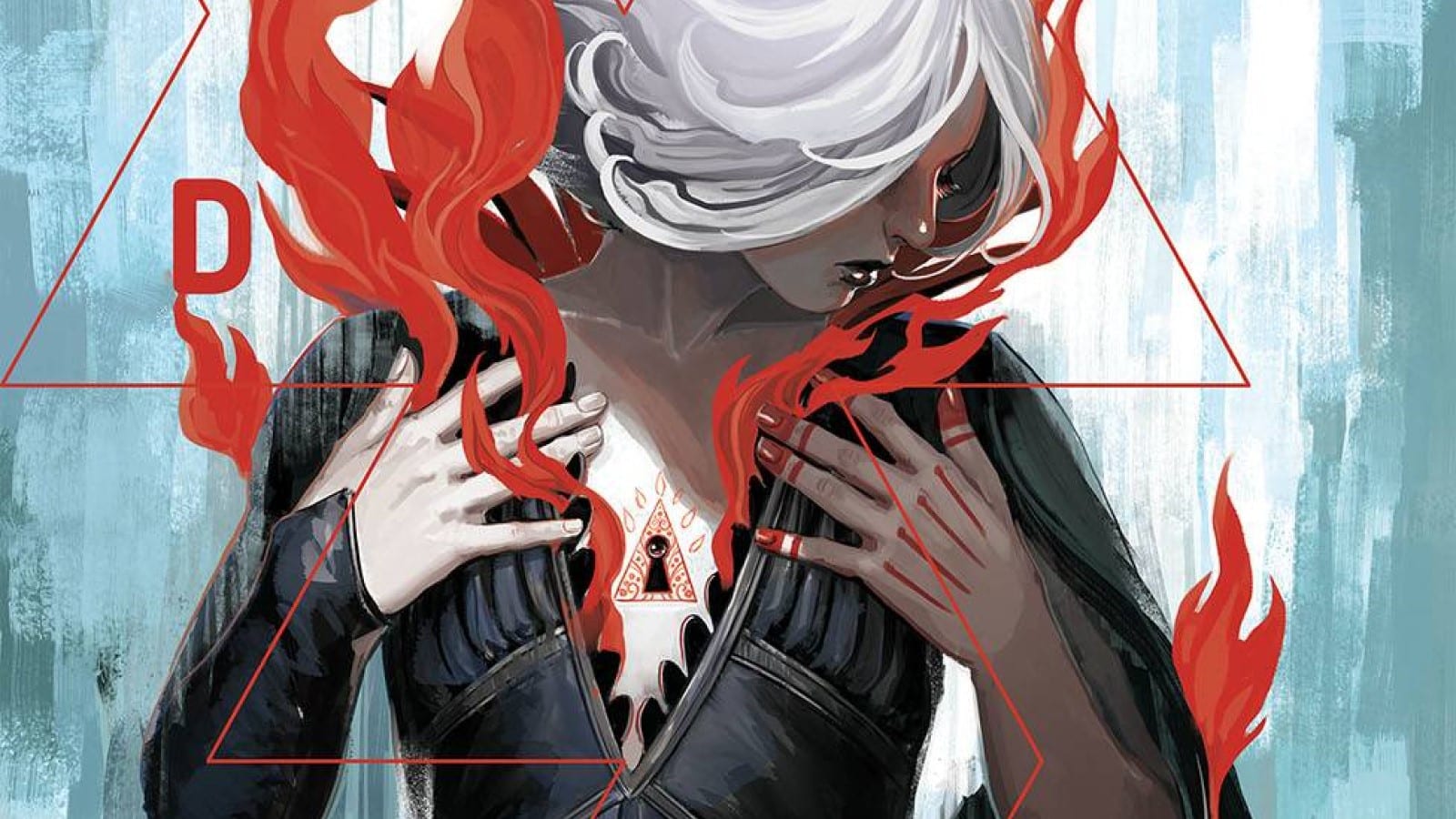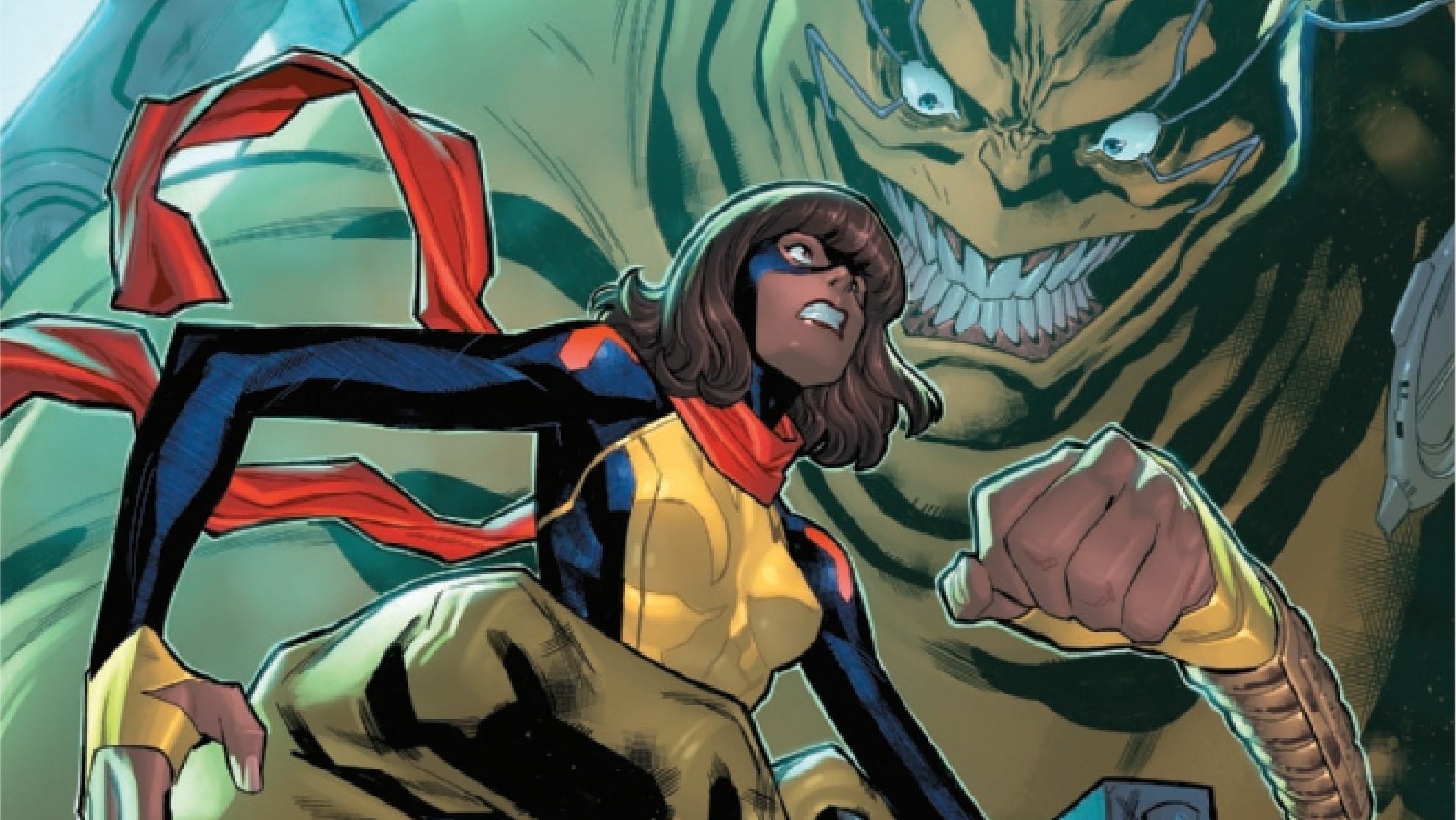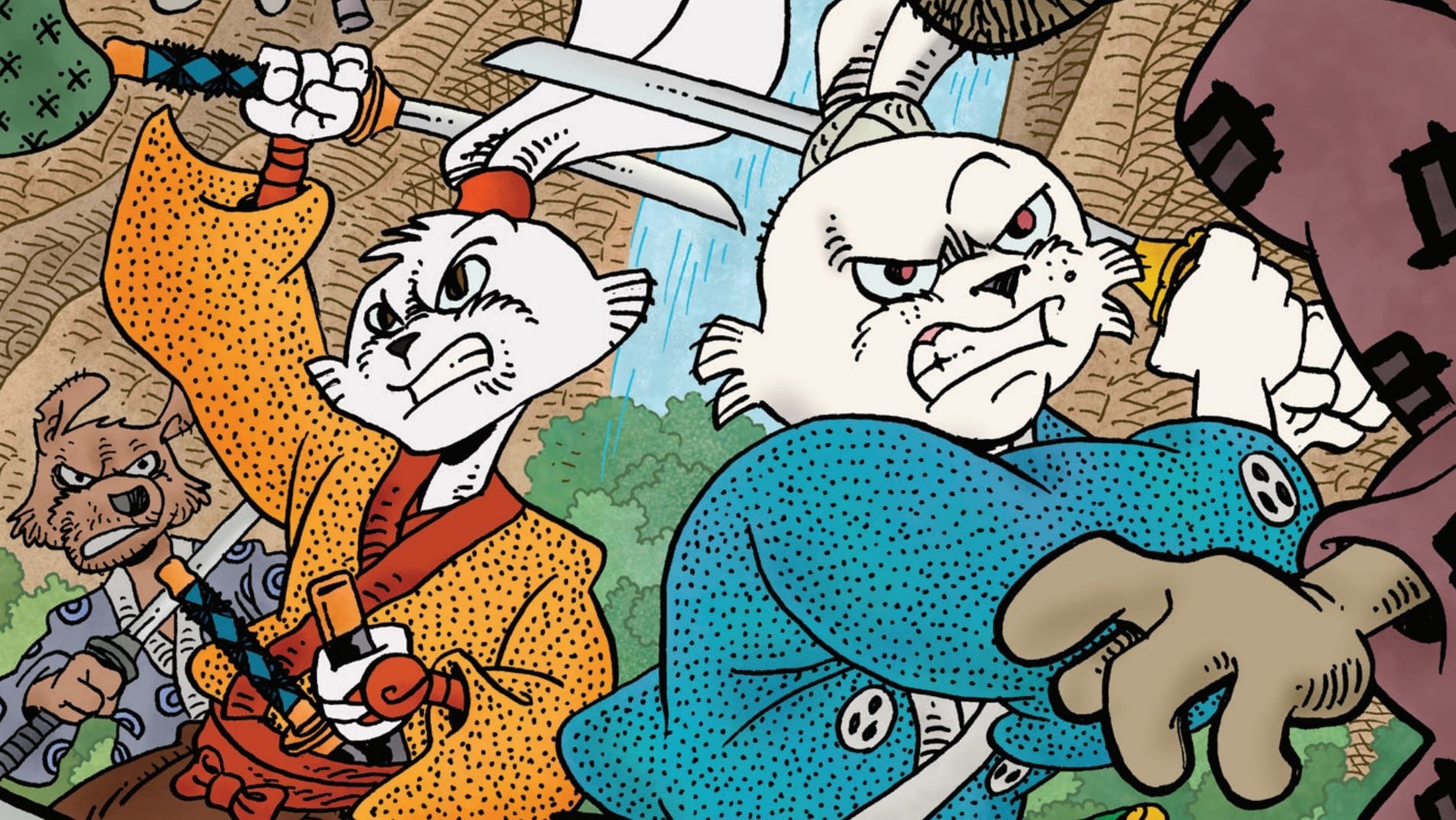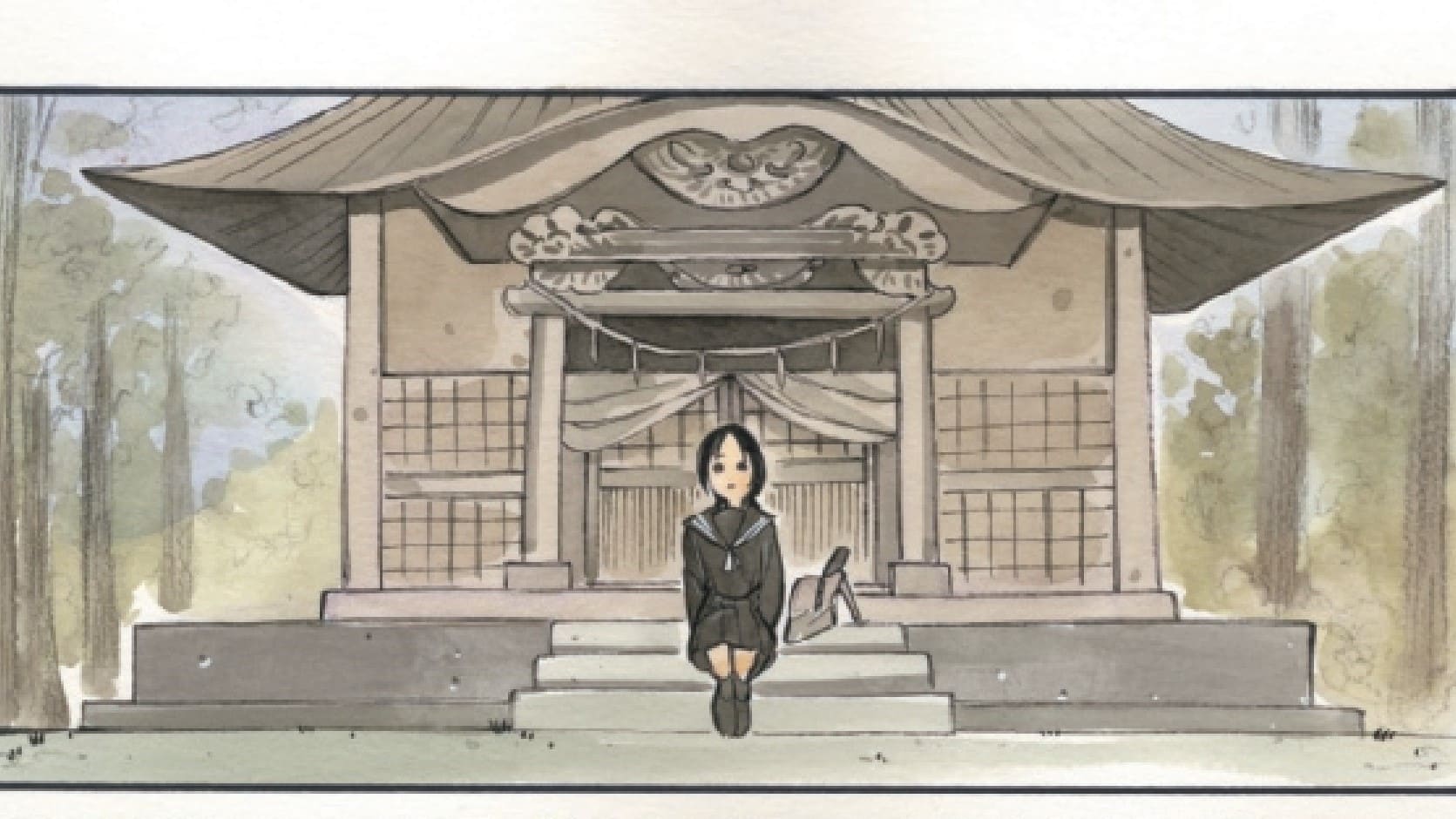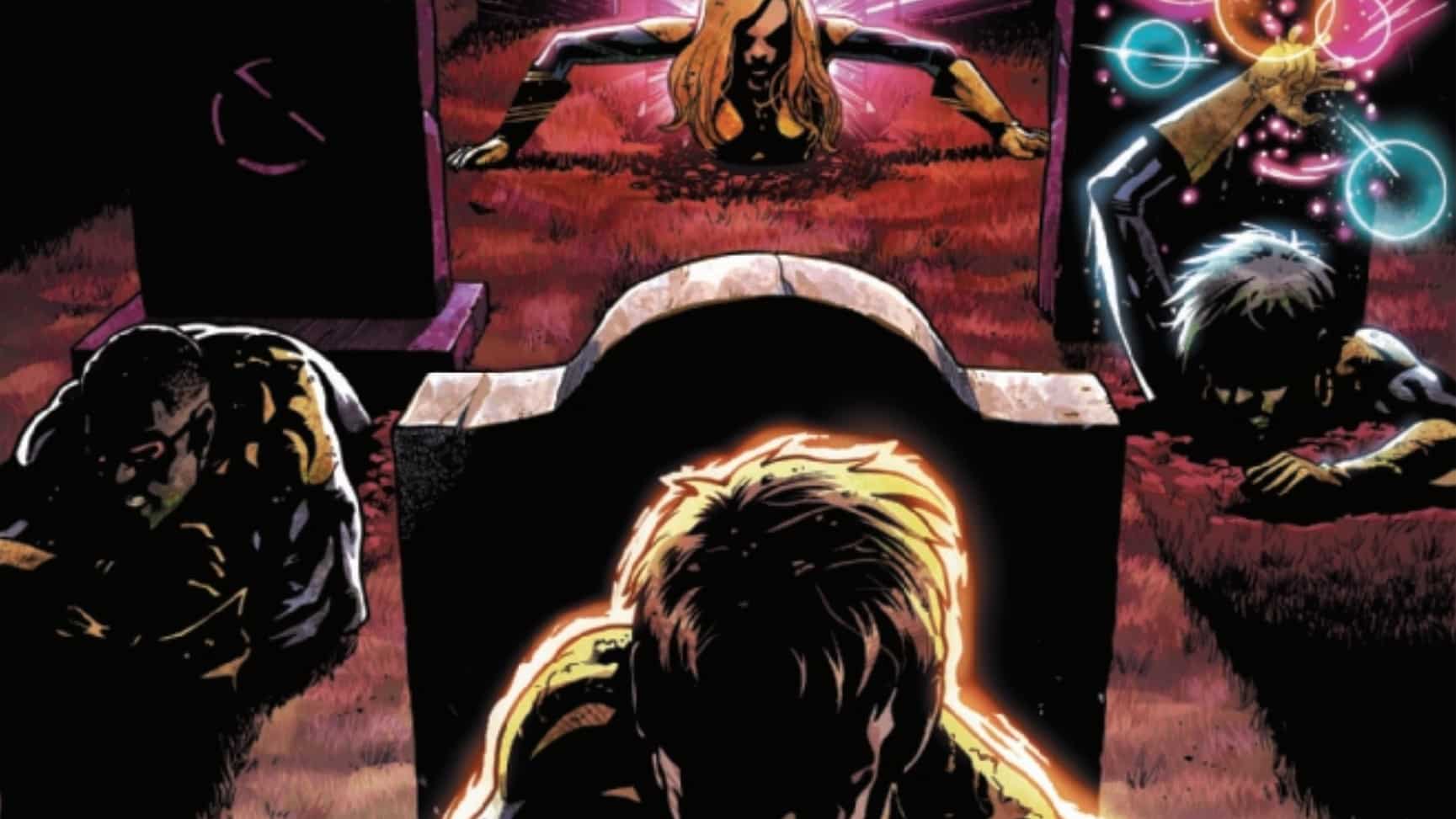The final encounter approaches. There is everything to play for, even if everyone’s already lost, in DIE #19, written by Kieron Gillen, drawn by Stephanie Hans and lettered by Clayton Cowles for Image Comics.
Mark Turetsky: Hi, Corey! It’s been a month, and we’re one step closer to DIE’s resolution, and the unraveling of all its mysteries.
Corey Smith: That we are! I know I’ve said this every issue, but I absolutely cannot wait for the next one — that goes double, considering it’ll be the last! I’ve gotta be honest though, Mark, even if next month misses the landing, this month’s penultimate issue was astounding. Emotional catharsis, plot developments, sacrifice, hope and, 19 issues into a 20-issue series, we finally know how to refer to our narrator! Where should we start?
Shadow and Flame

Mark: Well, as the title suggests, this is the “Boss Fight.” There’s no time to dungeon hack and level up. The boss is here, and we need to fight her (though I prefer the term “boss encounter,” personally)!
Corey: I’m a fan of “performance evaluation” myself, but that’s because there are no depths to which I won’t sink for a pun. Still, as far as intimidating boss fights go, a party member’s doppelganger is an RPG staple, though I don’t think I’ve seen one take the form of personified dysmorphia before.
Mark: There are a few game mechanic things that stuck out to me in this issue. First, the beta of the “DIE Core” game is focused on players creating characters called Personas (ie, the people in the “real world”) who then get sucked into the game world. And the idea in the one-shot format is to have each of the personas deal with some big emotional piece of baggage from their real world in-game.
We’ve seen a lot of that in the comic, but this is clearly the one Gillen and Hans have been holding back for as long as they could. And yet, it’s one of those things that it seems like the party has just tacitly agreed not to discuss, right? Like, they’re all pretty sure what’s going on here, but they still have Ash spell it out to them.
Corey: I can’t necessarily fault them for that — I’ve always felt it’s best to let people dictate the terms of those huge conversations themselves. The subject of Ash’s gender and identity has obviously been the elephant in the room, both in and out of universe, for the duration of the series, and while I absolutely expected some form of resolution, I’d be lying if I said part of me hasn’t been worried about how it would play out. While Gillen has an amazing track record with queer representation, fantasy as a genre tends to be messier. I’ve seen more than one story over the years explore concepts like this, stringing along an audience desperate for whatever scraps of representation they can get, only to pull the rug out from under them at the end. Or, even worse, act as if the reader was foolish for questioning things at all, because obviously the character is simply cis but in a different body, and expecting that to be unpacked further would be ridiculous. But this … this was good.
Mark: Don’t get me started on the cursed D&D item “Ring of Gender Swapping,” which seemed mostly designed to have real-world (presumed male) players poke fun at their fellow gamer for now playing as a girl! But, as much as I have next-to-no personal expertise in such subjects, this feels like a good way to handle it.
The Ash … monster? Balrog? Boss? is, first off, amazing in design. It’s Ash, but moreso. It’s also a very strong adaptation of Tolkien’s Balrog, a creature of “Fire and Shadow.” The way Hans renders the two halves of her body is just exquisite. But she’s also drawn from Tolkien’s Galadriel, being tempted by unlimited power: “not dark, but beautiful and terrible as the Morning and the Night! Fair as the Sea and the Sun and the Snow upon the Mountain!”
Persona Demons

Corey: It’s one hell of a design, that’s for sure. While I’m still lacking in my Tolkien expertise (I actually just started rereading The Hobbit, so I’ll get there eventually!), I have seen a lot of mirror bosses over the years, and this is probably one of the most interesting takes on the concept. Usually, these battles are against a dark mirror of the hero, often literally. Veering into video games for a second, it’s hard not to think of the Zelda franchise’s Dark Link battles. But Ash, like all of our party here, is already dark. Putting aside the none-more-goth outfit, she’s not some great paragon, on a quest to defeat evil. She’s a person, with human flaws and motivations, who hides important facets of who they are. That Ash’s obligatory dark doppelganger is a being of light, fully cognizant and aware of who they are, is something that works for me on a lot of levels.
Mark: She’s also incredibly cruel and manipulative. She always speaks in her version of The Voice (with some top-notch lettering by Cowles). Her word balloons are spiky, but not in any kind of regular pattern. They’re unsettling to read, almost like the lettering equivalent of physical pain. Even the tails of the balloons are disjointed. And the cruelty. She calls Ash “little man,” knowing full well what she’s doing.
The other game mechanic from the DIE RPG beta this brought to mind is the highest-level form of a dictator’s Voice. It’s measured in intensity of emotion, and, according to the beta rules, at the highest levels of emotional intensity, a dictator’s Voice might see someone’s “heart literally explode in [their] chest.” She uses this power level against Matt to make him “love [her] without limit” (another echo of Galadriel there, “love me and despair!”), and it nearly kills him.
Corey: It’s a line that Ash has brought out a couple of times now, almost always right before doing something awful, so seeing it thrown back against the party is fascinating. You made a good point bringing up her cruelty as well — while that has always been an aspect of Ash’s personality that we’ve had focus on, and one he’s had to reconcile with himself, its externalization shows exactly what that capacity for spite can do when it’s not held back by what remains of Ash’s restraint. For as much as they’ve spent the series narrating about their capacity for self-sabotage, the doppelganger is that but amplified, the personification of every moment of doubt, self-loathing and intrusive thoughts externalized out toward everyone else. And I’ve gotta say, all that? It resonates.
At the risk of getting overly personal, Ash’s narration throughout this entire sequence, not to mention the segment toward the end of the issue, really fucking hit me. I’ve spent a lot of time asking myself Big Questions About Gender over the past 15 years or so (though not nearly as much time as I’ve spent deliberately not thinking about it), and while these days I have largely landed on almost the exact opposite end of the spectrum from genderfluidity, all of those questions and worries have been the same. How queer is queer enough? What does it mean if dysphoria is a sometimes food, when I have friends who constantly struggle with it? Why didn’t I know these terms when I was growing up and needed them, and how fucked up is it that part of me resents the fact that younger generations have easier access to all of this? How much easier would things have been if I started mixing some they/thems into those he/hims years ago, and just come to terms with the fact that the whole gender thing just isn’t for me?
I’m gonna level with you, we got these review copies on Friday. It’s Monday-Night-Slash-Tuesday-Morning, and I’ve read this issue at least every day, and every time still feels like a punch in the gut. I’ve always been a fan of Gillen’s narration, and the sense of authenticity he brings to his protagonists (One day, when the world is ready, I’ll go in on my thoughts on Laura from The Wicked + The Divine), but I genuinely think this issue’s narration might be the strongest I’ve read. If nothing else, it’s given me an entirely unhealthy desire to have a dramatic confrontation with my inner demons while descending through a dungeon, and, really, isn’t that what fantasy should be about?
Mark: First off, thanks for sharing that. Second, it really calls to mind the aptness of the Borges epigraph on the back cover of this issue, about the meaning and necessity of dragons. And what Gillen has been great at during this whole series has been taking well-known moments of fantasy and not upending them or anything, but examining them from just a slightly different angle. Gandalf’s battle against Durin’s Bane and subsequent rebirth as Gandalf the White becomes one person’s struggle against dysmorphia and a rebirth into maybe not their final form, but a new form they can be happy with for now. As Ash tells it, “You don’t get to tell me who I am. Whatever it is, I decide.”
And you see their struggle. Even as they fall to almost certain death, Hans gives us this beautiful page showing Ash fighting it, literally tooth and nail, as they both fall. The major difference between Ash and Gandalf is that Gandalf’s change from Gandalf the Grey to Gandalf the White removes so much of what makes him lovable. He’s no longer a wizard who’s going to joke around with friends, he’s become a purified instrument of Eru’s will upon Middle Earth, whereas with Ash, as she puts it, “you choose what to leave behind, and then you choose what to take.”
And it’s apt that you bring up WicDiv, too. The magical transformation while falling is becoming a big theme for Gillen’s work. And the way he ties Gandalf’s fall in Moria to Gollum’s fall in Mount Doom, both of which ultimately lead to the salvation of the world, DIE is just bursting with this imagery.
Corey: In fairness, when you get right down to it, there’s truly none-more-goth than a good ol’ capital-F Fall, y’know? Normally I’d point out the layers involved with a literal descent into darkness culminating in Ash’s rebirth in light, but I think it’s important to keep in mind that even in DIE, “light” doesn’t necessarily mean “good.” While this is, don’t get me wrong, a great personal step for Ash’s character growth, there’s a very real chance that accepting the parts of herself that she was holding back simply means that Ash is going to be more Ash. Even if she still manages to hold back the aspects of herself that hurt people, we’ve seen what she can do when she’s holding back, and it isn’t pretty. I would absolutely love to take her at her word, and say that she’s choosing what to take, but let’s not mince words here: There’s still an issue left for everything to come crashing down.
The Fellowship of the Broken

While Ash’s apotheosis was possibly the most satisfying part of the issue, it was far from the only thing that happened. I can’t help but notice that damn near everyone else in the party has lost something vital going into this final confrontation. Like I mentioned earlier, Izzy is cut off from the other gods, and Matt has lost a weapon, but the Fair were slaughtered by Die, and we’ve been slowly watching Chuck lose everything that makes his role as the Fool work for the entirety of this arc. I can’t help but think, however, that the most important factor is going to be Sol, who’s lost the desire all Fallen have to feed on Players to regain his own life. What’s your take on everything going on with the rest of the party?
Mark: The parallel between the Fool and the Rogue class wouldn’t be complete without some backstabbing, would it? Chuck’s murder of Molly in order to get the Fair gold inside her really hurt (It also clears up that mysterious line from Matt in the previous issue). I mean, it’s such a trope of RPGs and video games that you have to kill people and things to get their treasure. It’s just the fucked up world of DIE where one of those monsters is someone’s child. And, ultimately, for the sake of a power-up for a robot dog (a power-up that might save the world, yes, but still, a power-up in a game; “Fuck you, you manipulative bastard planet” indeed).
Matt in this issue has weird echoes of Ash, with both of them dealing with externalized incarnations of their fears and doubts. Isabelle is cut off from the gods. Basically, everyone (save probably Ash) is kinda at their lowest point going into the final boss encounter next month. And we get more LotR pastiche with the “last alliance” between H.G. Wells and the Fair, which ultimately fails. Things are not looking great moving forward, are they?
Corey: They are not, and I couldn’t be more ecstatic about it if I tried. Much like our party, I wonder how this is all going to play out, and I’m nowhere near an answer.
The thing about this creative team is that while I genuinely believe they’ll stick the landing, I have no idea what form that’s going to take. A giant fantasy battle? A protracted debate? A heartfelt conversation with the sentient personification of time loops and creators who put far too much of themselves into their work? At this point, all I know for sure is that it’s going to be absolutely beautiful.
Mark: I’m putting my money on some version of the Scouring of the Shire, and I’ll leave it at that.
Random Throws of the DIE:
- “Die,” “extract,” this series is piling up euphemisms for murder.
- “Ahead is a dungeon and I do not know the way.” More direct dialogue lifts from Lord of the Rings.
- Angela’s dog turning out to be pay-to-win DLC. Screw that!
- I am suddenly overcome with the urge to play a campaign with a Neo who has figured out the fantasy equivalent of The Pirate Bay. (Not play as one, I’m not that munchkin-y.)
- Lewis’ Wardrobe as a closet. Gillen is just so good at recontextualising fantasy tropes.

